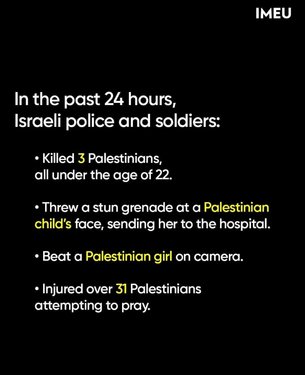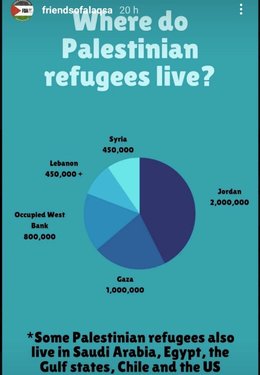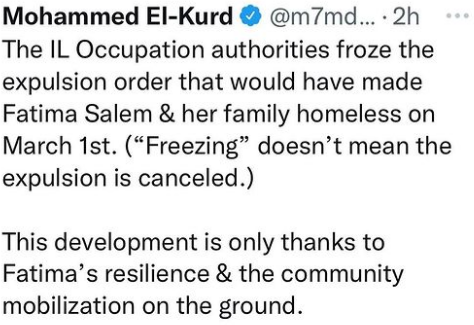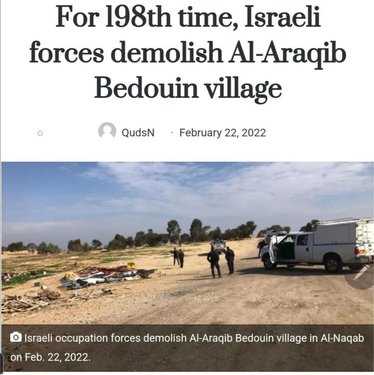-
Posts
8,461 -
Joined
-
Days Won
773
Content Type
Profiles
Forums
Events
Everything posted by ummtaalib
-

Calling out double standards of world leaders and media
ummtaalib replied to ummtaalib's topic in General Islamic Discussions
Can we blame the Palestinian people for their heartfelt outcry at this? http:// BBC Ukraine conflict: The women making Molotov cocktails to defend their city Telegraph Glory to Ukraine: Civilians take up weapons in the battle for Kyiv -

Calling out double standards of world leaders and media
ummtaalib replied to ummtaalib's topic in General Islamic Discussions
People should talk about Palestine as they do Ukraine, says Egyptian squash star Ali Farag Egypt’s World No. 1 squash player Ali Farag has brutally exposed the hypocrisy of the West and the media on the Ukraine crisis saying the ‘Palestinians have been going through that for the past 74 years.’ As expected, Farag’s speech on the Ukraine crisis was removed from the official video posted on the tournament’s YouTube channel. -
The double standards of world leaders and journalists has definitely been made apparent since the Ukrainian crisis happened. The blatant racism clear for all to see Following khutbah is worth a listen and worth reflection. We should educate ourselves and others! Reflections on the Russian Invasion of Ukraine Dr. Yasir Qadhi https://www.youtube.com/watch?v=9dyqxf8LnYQ
-
Israel's ban on family reunification Israel is doubling down on its apartheid rule over Palestinians while it and its international accomplices attempt to fend off the label. This week, Israel reinstated a ban on Palestinian family unification as part of its demographic engineering efforts to ensure a Jewish majority in the territory of historic Palestine. Adalah, a group that advocates for the rights of Palestinians in Israel, said that the legislation is “one of the most racist and discriminatory laws in the world, and must immediately be repealed.” The “Citizenship and Entry into Israel” order prohibits Israel’s interior minister from granting residency or citizenship to Palestinians from the West Bank and Gaza who marry citizens of Israel. According to Adalah, which will challenge the law at Israel’s high court, “it also bans unification between a citizen or resident of Israel with spouses from ‘enemy states,’ including Syria, Lebanon, Iraq and Iran.” Adalah added that “UN human rights bodies have called on Israel to revoke the ban on Palestinian family unification as it violates international law.” Israel’s parliament, the Knesset, has renewed the temporary order banning family unification 21 times over the past 18 years, the rights group added. However, unlike in the past, the current version of the law “explicitly states that its purpose is to ensure a Jewish demographic majority,” Adalah said. Israeli lawmakers and Ayelet Shaked, the state’s interior minister, have said that the legislation is intended to prevent Palestinians from gradually returning to their homeland. More here
-
Double standards on Ukraine coverage The World’s #1 Squash player, Egypt’s Ali Farag calls out double standards on Ukraine coverage: “We’ve never been allowed to speak about politics in sports, but all of a sudden now it’s allowed…the #Palestinians have been going through that for the past 74 years...we can talk about Ukraine, we can talk about #Palestine.”
-
Settler violence continues A right-wing settlers group, vandalized the tires of over 30 Palestinian-owned cars in the town of Jaljoulia in 1948-occupied lands. Video here Colonial Israeli settlers have set up a new outpost on a mountaintop on the outskirts of Battir village, a Unesco World Heritage site, in the occupied West Bank city of Bethlehem, sparking concern amongst locals who fear the outpost will lead to further confiscation of their land Source
-
Israel bans family reunification Israel's Knesset passed a law effectively barring Palestinians from the West Bank or Gaza who are married to Palestinian citizens of Israel from gaining citizenship ora residency in Israel, according to the Palestinian Information Centre. The Knesset approved the Citizenship and Entry into Israel Law (Temporary Order), 2022, by a 45-15 majority vote yestersday. While Israel claimed the law was passed for security reasons, it is believed the law was passed on racist grounds to prevent Palestinians from the West Bank or Gaza who marry Palestinians or Israeli Jews from becoming Israeli citizens in order to maintain a Jewish majority in Israel. The new temporary order explicitly affirms that its purpose is to ensure a Jewish demographic majority. The law also prohibits the entry of Arabs from countries "hostile" to Israel, such as Lebanon, Syria, Iraq and Iran, for family reunification purposes. Israel's Knesset passed a law effectively barring Palestinians from the West Bank or Gaza who are married to Palestinian citizens of Israel from gaining citizenship or residency. The Israeli Knesset approved the Citizenship and Entry into Israel Law (Temporary Order), 2022, by a 45-15 majority vote on Thursday. While Israel claimed the law was passed for security reasons, it is believed the law was passed on racist grounds to prevent Palestinians from the West Bank or Gaza who marry Palestinians or Israeli Jews from becoming Israeli citizens in order to maintain a Jewish majority in Israel. The new temporary order explicitly affirms that its purpose is to ensure a Jewish demographic majority. The law also prohibits the entry of Arabs from countries "hostile" to Israel, such as Lebanon, Syria, Iraq and Iran, for family reunification purposes. Rights groups have long warned of the seriousness of the law, which the Israeli government claims was enacted for security reasons. Palestinians consider the law racist. middleeastmonitor
-
Question: I have a few questions regarding the marriage process. 1. Is it permissible for me to get to know a girl with the intention of marriage? (i.e. texting, video calling, meeting in person) 2. My friends say that it is permissible if the girl involves her mehram (i.e. brother) as a chaperon in the process? As example, a WhatsApp group is created and I add her and her brother and then we chat with each other in the group in the presence of her mahram. Or if I meet her in person at some public place (i.e. cafe) and she is accompanied with her brother. 3. If not, what would be the permissible way to get to know someone within the boundaries of Shariah? As some of the parents in the western countries, have no connections in the community, therefor many single people use Muslim marriage apps to find spouse. Where the prospect is totally stranger and it’s difficult to commit in a relationship of marriage without a clear picture. 4. What's the ruling of texting/calling after engagement? Answer: In the Name of Allah, the Most Gracious, the Most Merciful. As-salāmu ‘alaykum wa-rahmatullāhi wa-barakātuh. In principle, it is not permissible for a person to unnecessarily speak with a non-mahram woman. Shariah has closed all doors that may lead one to commit illicit sins. If a person wishes to marry someone then it is permitted, rather recommended, to look at a potential spouse before marriage provided one is seriously contemplating marriage. See the following hadith: عَنْ أَبِي، هُرَيْرَةَ قَالَ كُنْتُ عِنْدَ النَّبِيِّ صلى الله عليه وسلم فَأَتَاهُ رَجُلٌ فَأَخْبَرَهُ أَنَّهُ تَزَوَّجَ امْرَأَةً مِنَ الأَنْصَارِ فَقَالَ لَهُ رَسُولُ اللَّهِ صلى الله عليه وسلم " أَنَظَرْتَ إِلَيْهَا " . قَالَ لاَ . قَالَ " فَاذْهَبْ فَانْظُرْ إِلَيْهَا فَإِنَّ فِي أَعْيُنِ الأَنْصَارِ شَيْئًا " . Abu Huraira (Allah be pleased with him) reported: I was in the company of Allah's Messenger (Sallallahu Alayhi Wasallam) when there came a man and informed him that he had contracted to marry a woman of the Ansar. Thereupon Allah's Messenger (Sallallahu Alayhi Wasallam) said: Did you cast a glance at her? He said: No. He said: Go and cast a glance at her, for there is something in the eyes of the Ansar. (Muslim 1424) عَنِ الْمُغِيرَةِ بْنِ شُعْبَةَ، أَنَّهُ خَطَبَ امْرَأَةً فَقَالَ النَّبِيُّ صلى الله عليه وسلم " انْظُرْ إِلَيْهَا فَإِنَّهُ أَحْرَى أَنْ يُؤْدَمَ بَيْنَكُمَا " . Bakr bin Abdullah Al-Muzani narrated that: Al-Mughirah bin Shu'bah proposed to a woman, so the Prophet (Sallallahu Alayhi Wasallam) said: "Look at her, for indeed that is more likely to make things better between the two of you." (Tirmidhi-1087) If a person is interested in marrying a girl, he should see her and enquire about her from her Mahrams and any other possible avenue. He should thereafter make Istikhara. The girl should also adopt the same procedure. This is in keeping with each other’s dignity, respect and honour. It will not be permissible to interact with a potential spouse by speaking, texting or video calling her. The purpose of looking at a potential spouse is to ascertain their physical appearance and beauty not their character and lifestyle. The most effective method of ascertaining the character and lifestyle of a prospective spouse is through their relatives and other associates. In regards to speaking with one’s fiancé, according to Shariah, an engagement is merely an agreement that the parties will marry in the future. It does not change the fact that the engaged couple are both strangers for one another before marriage. Therefore, it will not be permissible to interact with one’s fiancé, whether this is over the phone, e-mail etc. And Allah Ta’āla Knows Best Checked and Approved by, Mufti Ebrahim Desai (Rahimahullah)
-

Information on 15th Sha'baan - Night Of Barãt
ummtaalib replied to ummtaalib's topic in General Islamic Articles
Sha’ban - A Month for Rehearsal The sighting of the Crescent of Sha’ban signals the good news of Ramadan’s imminent arrival. A believer grows in anticipation with the passing of each day. Days like these, are what a believer ‘lives for’. A Month for Rehearsal In addition to it being the most virtuous month - outside Ramadan - to fast, another reason for Nabi (sallallahu’alayhi wasallam) increasing his optional fast in Sha’ban was to prepare for Ramadan as well as to respectfully welcome Ramadan. (Lataiful Ma’arif, pg. 258) This illustrates how Rasulullah (sallallahu ’alayhi wasallam) would spiritually prepare himself in advance for the most auspicious month of the year; Ramadan. It is similar to the Sunnah Salah we offer before and after the Fard Salah. For the Fard fast of Ramadan, we are taught to offer nafl fasts before and after (i.e. in Sha’ban and Shawwal). (Lataiful Ma’arif, pg.249) Similarly, the Sahabah (radiyallahu ’anhum) and Tabi’un (rahimahumullah) would also engage in what we would understand as ‘spiritual preparation’ for Ramadan. Sayyiduna Anas (radiyallahu ’anhu) says: ‘When Sha’ban would commence, the Muslims (Sahabah and Tabi’un) would dedicate themselves to the recital of the Quran.’ (Lataiful Ma’arif, pg.258) Hafiz Ibn Rajab Al-Hambaly (rahimahullah) writes: ‘Since Sha’ban is a prelude to Ramadan, Islam encourages certain deeds in this month that are usually done in Ramadan like fasting and Quran recital. This prepares the soul to welcome Ramadan, with open arms.’ (Lataiful Ma’arif, pg.258) Another form of preparation In addition to the above deeds and their like, there is another form of preparation that is absolutely essential. That is to settle our disputes and cleanse the hearts from jealousy, rancour and I’ll-feelings. A Hadith in Sahih Ibn Hibban, mentions of four people that will be deprived on auspicious nights: a) An alcoholic. b) One who disobeys his parents c) One who severe family ties d) One who harbours ill-feelings in his heart for others People who hold onto old grudges, and do not settle their disputes, nor cleanse their hearts are usually deprived on Allah’s mercy, even on blessed occasions. Therefore it is imperative for a believer, as part of his preparation for Ramadan, to sort out such issues ahead of time. 15th of Sha’ban (Laylatul Bara’ah) The beginning of Sha’ban is a time for us to reset our minds hearts and routines for Ramadan. Barely two weeks into the month, will bring the occasion of the fifteenth night of Sha’ban. This night is labelled as the second most auspicious night of the year, by some Scholars. (Lataiful Ma’arif, pg. 264) Allah Ta’ala, through His wisdom granted the Ummah this auspicious night as a prelude to Ramadan. On that night too, those who harbour ill-feelings are deprived of Allah’s Mercy and Forgiveness. Therefore, one should understand that today is an ideal time to reflect on the above and to make efforts to implement them too. Let’s increase our nafl ‘ibadah from today, so that when Ramadan does arrive, we are well rehearsed and ready to maximise our benefit therefrom. May Allah Ta’ala guide and inspire us all. Ameen. Laylatul Bara’ah will be after Maghrib on Thursday night, 17th March 2022 in South Africa. Al-Miftah Jamiatul Ulama (KZN) Council of Muslim Theologians -

Nikah of a woman immediately after accepting Islam
ummtaalib posted a topic in Hanafi Fiqh (General)
Question and Answer: Q. A Hindu couple had been married. The Hindu wife accepted Islam. Can the revert Muslim woman who had been a Hindu wife marry a Muslim man immediately after accepting Islam or does she have to wait for a period before making Nikah? When can she make Nikah? (Question published as received) A. As per Islamic Law, marriage between a Muslim female and a non-Muslim male is invalid. Accordingly, the marriage between a non-Muslim couple is suspended if the wife reverts to Islam. If the husband accepts Islam within three menstrual cycles, their marriage will remain intact. If the husband does not accept Islam, the marriage between them ends at the expiry of three menstrual cycles. Therefore, a non-Muslim married woman who accepts Islam may not immediately marry a Muslim man after her reversion. She may only do so once three menstrual cycles pass after her reversion and on the condition that her husband does not revert to Islam. (Shaami 3/191) NB. If the woman is pregnant, the period of suspension will be until birth. If the woman is in menopause, the period of suspension will be 3 months (90 days). And Allah Ta’ala Knows Best Mufti Ismaeel Bassa Mufti Moosa Salie (The answer hereby given is specifically based on the question asked and should be read together with the question asked. Islamic rulings on this Q&A newsletter are answered in accordance to the Hanafi Fiqh unless otherwise stated.) Fatwa Department Jamiatul Ulama (KZN) Council of Muslim Theologians -
A Clear Proof By Shaykhul-Hadīth, Hadrat Mawlānā Muhammad Saleem Dhorat hafizahullāh In this verse, Allāh ta‘ālā proclaims that it is He and He alone who has revealed the Glorious Qur’ān to mankind, which means it is His Word. This claim is followed by a proof to validate it, that Allāh ta‘ālā Himself is its Guardian and Protector. When Allāh ta‘ālā protects something, nothing and no one can ever interfere with it, so the continual preservation of the Qur’ān is a proof that it is the Word of Allāh ta‘ālā. There are many other proofs of the divine origin of the Qur’ān, including its i‘jāz (inimitability) which makes it impossible for mankind to invent even a single verse to match the Qur’ān in its perfection. However, the preservation of the Qur’ān is a proof that even a child can understand. 1,430 years have gone by and it is still plain for everyone to see that not a single change has occurred in the Qur’ān. To fulfil the promise of protecting the Qur’ān, Allāh ta‘ālā has created a comprehensive system consisting of scribes who accurately copy the text; Huffāz who accurately memorise its words; Qurrā who preserve its correct pronunciation and mode of recitation; and Mufassirīn, Muhaddithīn, Fuqahā and ‘Ulamā who protect its meaning and message. Non-Muslim experts also acknowledge that despite the passage of fourteen centuries, it has not undergone even the slightest alteration, not of a single letter or harkat (diacritical mark). It is obvious that a very powerful being must be safeguarding the Qur’ān for it to have been preserved over so many centuries. The Protected Book ‘Allāmah Qurtubī rahimahullāh narrates an interesting story about the preservation of the Qur’ān. Once a stranger attended one of the debates that the ‘Abbāsī Khalīfah, Ma’mūn Rashīd, used to hold at his court. The man spoke eloquently during the debate, and afterwards Ma’mūn summoned him. Sensing that he was not a Muslim he asked him whether he was a Jew. The man replied that he was. Ma’mūn then invited him to embrace Islām and, as a test, offered him incentives for doing so. However, the man preferred to keep his religion, the religion of his forefathers. A year later, the same man attended the court of Ma’mūn as a Muslim and spoke learnedly on Islamic jurisprudence. Afterwards, Ma’mūn called him and asked him if he was the same man who had come the year before. He replied that he was, and upon being asked how he had become a Muslim he told his story: ‘After I had left the debate the previous year, I decided to examine the different religions. Being a good calligrapher I made three copies of the Tawrāt, making some additions and omissions in the process. I took the copies to the Jews and they bought them from me. I then made three copies of the Injīl, again making some additions and omissions, and took them to the Christians, who bought them. Then I did exactly the same with the Qur’ān and took the copies to the Muslims. They checked them and when they noticed the additions and omissions, they discarded the copies and refused to buy them. I realised then that this was a protected book, and that was how I came to embrace Islām.’ Enthusiasm for Memorising the Qur’ān The preservation of the Qur’ān is a great miracle and the means Allāh ta‘ālā employs are also amazing. Parents who encourage their children to memorise the whole Qur’ān are aware of the rewards they and their children will receive for doing so, but the children themselves are not. If you were to ask the students of a typical hifz class what the rewards for memorising the Qur’ān are, the majority would not be able to reply. Despite this, the desire Allāh ta‘ālā places in their hearts to memorise the Qur’ān is such that very few, if any, would dream of giving it up. Wherever you go, you will see that there are never enough ḥifẓ classes and that they are always oversubscribed. Just think: what power is there that is keeping our children committed to memorising the Qur’ān? There are countless other well-known good deeds that promise great rewards, yet people do not adhere to them with such commitment and dedication as to memorising the Qur’ān. Allāh ta‘ālā Himself puts the love of memorising His Word into the hearts of young people. Nowhere in the whole world will you see classes full of children memorising a book that they do not understand. It is a miracle of the Qur’ān that people are able to learn a whole foreign alphabet and how to read in a foreign language without also learning to understand the language, and then to memorise a whole book in that language, and then to keep it in their memories for the rest of their lives. Remarkable Huffāz Throughout history there are examples of people who memorised the Qur’ān at a very young age and also in a very short time. Ibn Labbān rahimahullāh memorised the whole Qur’ān in just one year, remarkable in itself, but even more amazing is that he completed his memorisation at the age of five! Hāfiz Ibn Hajar Al-‘Asqalānī rahimahullāh became a Hāfiz by the age of nine and at the age of twelve led the tarāwīh salāh in Al-Masjidul-Harām. Ibn Shihāb Az-Zuhrī rahimahullāh memorised the whole Qur’ān in eighty days. When Imām Muhammad rahimahullāh went to study under Imām Abū Hanīfah rahimahullāh, he was asked whether he had memorised the whole Qur’ān or not, for admission to his classes was conditional on being a Hāfiz. He replied that he had not, but his desire to acquire knowledge was so great that he returned after just one week and told Imām Abū Hanīfah rahimahullāh that he was now a Hāfiz! Connect Yourself to the Qur’ān After learning something of the miraculous nature of the Glorious Qur’ān, we need to take some practical steps to connect ourselves with it: 1. Connect yourself to the Qur’ān by reciting it regularly. Recite one juz daily, or if that is not possible then half a juz or a quarter, but recite daily. If the remembrance of Allāh ta‘ālā in its various forms such as tasbīh, tahmīd, salāt ‘alan-Nabī, du‘ā etc. are compared to individual ‘vitamins’ that are beneficial to a person’s spiritual health, the Qur’ān can be likened to a multivitamin, for it contains them all. 2. Attend tajwīd classes in your locality in order to learn how to recite the Qur’ān properly, as it is one of the rights of the Qur’ān. 3. Attend the durūs (lessons) of the Qur’ān delivered by the ‘Ulamā in your locality in order to understand the message of the Qur’ān. 4. Practise upon the teachings of the Qur’ān. 5. Spread the beautiful message of the Qur’ān. 6. Respect the people of the Qur’ān, i.e. the Huffāz, Qurrā and ‘Ulamā. Refrain from disrespecting them and talking ill of them at all costs. Sayyidunā Abū Dardā radhiyallāhu ‘anhu has said: May Allāh ta‘ālā grant us love for the Qur’ān, an affinity with it and the ability to memorise it, recite it in the proper manner, understand it and act according to it. Āmīn. Extracted from 'Inspirations' (Part 1) © Islāmic Da'wah Academy
-
8: Pray in the Congregation & Do Not Delay 9: Be Punctual With Your Sunnah Prayers 10: Eliminate Distractions Before praying ṣalāh, always try your best to remove distractions. Anything which may distract or worry you in ṣalāh will reduce the khushūʿ in your ṣalāh. Ibn Kathīr (raḥimahullāh) says, “Khushūʿ in ṣalāh is only attained by the one who has emptied his heart totally for it, who occupies himself fully for it and does not pay attention to anything else besides it, and who prioritises it over everything else. At that point it becomes a source of comfort and intense joy.” So if you are hungry, eat before you pray. Similarly, if you need to relieve yourself, do it before you pray. The Messenger of Allah ﷺ said, “Ṣalāh should not be performed when the food has been presented, nor when one is fighting the urge to go to the bathroom” (Abū Dāwūd). He ﷺ also said, “If dinner is served, and the iqāmah for ṣalāh has been given, then start with the dinner” (Bukhārī). Imām al-Munāwī (raḥimahullāh) explains that the above narrations indicate that it is more important and virtuous to pray with the presence of the heart, than to pray at the start of the prayer time. How to eliminate distractions • Find a quiet place to pray. Avoid praying where others are talking or where there is a noise that is likely to distract you. • Mentally go ‘offline’ for your ṣalāh by ensuring your phone is on ‘silent mode’. Avoid checking your phone between the farḍ and sunnah prayers. • If you have a small child, where possible, ask someone to look after them whilst you pray. • Avoid performing your ṣalāh whilst you have urgent matters waiting. For instance, if you are cooking, then turn off the cooker for the duration of the ṣalāh to stop you worrying about it during your ṣalāh. • Pray where you are comfortable. Avoid anywhere where it is too cold or too hot, as this might hinder your ability to focus. • Pray in clothes which are not distracting. The Prophet ﷺ once returned a garment which had patterns on it to one of his Companions (radiy Allāhū ‘anhum) because it distracted him during his ṣalāh (Bukhārī). • Ensure you are not surrounded by distracting objects. The Prophet ﷺ told his wife ʿĀ’ishah (raḍiy Allāhu ‘anhā) to remove a curtain because its pictures had diverted his attention in ṣalāh (Bukhārī). • Pray towards a sutrah (a barrier or a wall in front of you). The Messenger of Allah ﷺ said, “When one of you prays towards a sutrah he should stay close to it and not let Shayṭān interrupt his ṣalāh” (Abū Dāwūd). The wisdom behind using a sutrah is to prevent your eyes glancing further than the sutrah and, therefore, beyond your place of prayer. It also stops people from passing in front of you, and stops ṣhayṭān from passing by and ruining your prayer. Occasionally, during ṣalāh, we may find ourselves distracted due to thinking about petty matters. On such occasions, we should try to remember the greatness of the One we are conversing with and the majesty of the One looking at us. We should think about death and the hereafter, and rein in our thoughts to bring our minds back to ṣalāh. Learn the fiqh of ṣalāh Learn and regularly refresh your knowledge of the legal rulings of ṣalāh, so that you are not distracted by thoughts like, ‘Is my ṣalāh valid/should I be repeating the prayer, or is sajdah al-sahw sufficient?’ This will help you to pray ṣalāh more calmly and with greater khushūʿ.
-
Every parent has deep love for their child, causing them to constantly feel concerned over the safety, well-being and progress of the child. Such is the concern of the parents that if they hear of any threat in the neighbourhood, such as kidnappings, they will immediately caution their children and keep them housebound, out of the fear that they should not become victims. Furthermore, when leaving the home, the parents will not allow the child out of their sight, and may even go to the extent of holding their hand the entire time. However, this is as far as visible threats are concerned. Just as there are visible people who are threats to our young children, there is also an unseen or invisible danger that threatens our children. This is the threat of shayaateen and jinn that cast their evil influence over young children, thus harming and affecting them. Sayyiduna Jaabir bin ‘Abdillah (radhiyallahu ‘anhu) reports that Rasulullah (sallallahu ‘alaihi wasallam) said, “When the night comes in, then hold back your children (i.e. keep them indoors). When some portion of the night has passed then you may leave them (to come out of the home).” The hadeeth further explains that the reason for this is that the evil jinn are especially active and roam about at that time. Hence, there is a fear that they may harm or affect young children (who are more vulnerable to these types of attacks. (Sahih Bukhari) Ibnul Jowzi (rahimahullah) has mentioned that one of the reasons for young children being more vulnerable is that they generally cannot read the Duas of protection. (Fathul Baari vol. 6, pg. 420) Hence, we should make a concerted effort to teach our children the Duas of protection, as soon as they are able to learn them, as well as inculcate in them the habit to recite these Duas regularly. By doing so, insha-Allah our children will remain safeguarded from the attacks and evil influence of the jinn. We should also make Dua to Allah Ta‘ala for their protection. Sayyiduna ‘Abdullah bin ‘Abbaas (radhiyallahu ‘anhuma) reports that Rasulullah (sallallahu ‘alaihi wasallam) would recite the following Dua for the protection of his grandsons, Sayyiduna Hasan and Sayyiduna Husain (radhiyallahu ‘anhuma): أَعُوْذُ بِكَلِمَاتِ اللهِ التَّامَّةِ ، مِنْ كُلِّ شَيْطَانٍ وَهَامَّةِ ، وَمِنْ كُلِّ عَيْنٍ لَامَّة “I seek protection (for the two of you), in the complete and perfect words of Allah Ta‘ala, from every shaitaan and poisonous (or harmful) creature, and from every eye that causes harm.” Furthermore, Rasulullah (sallallahu ‘alaihi wasallam) mentioned that Nabi Ebrahim (‘alaihis salaam) would recite this very same dua and seek protection for his sons, Nabi Ismaa‘eel (‘alaihis salaam) and Nabi Ishaaq (‘alaihis salaam). (Sahih Bukhari) May Allah Ta‘ala keep us and our children in the shade of His Divine protection, Ameen. Uswatul Muslimah
-
Answered by Ustadha Naielah Ackbarali Question: I was hoping that perhaps you could help me understand why a menstruating women is not allowed to touch a Qur’an, or I suppose more so why a menstruating women is deemed “impure.” Somehow it has been bothering me that all women would be considered impure for so many days a month, such that they are too impure to touch Allah’s book. Even the verse that talks about nobody touching the Qur’an except the pure ones makes one feel so dirty to have no way at times of becoming part of the pure ones. I suppose it reminds me too much of the Hindu and Christian concept wherein a menstruating women is dirty. Is there wisdom that you have that would provide some comfort? Answer: Bismi Llahir Rahmanir Rahimi Thank you for your question. This is an important topic that needs to be addressed as many others may share similar sentiments. It is understandable why these types of feelings may develop, especially if one is not familiar with Islam’s position on menstruation. Islam does not consider menstruation to be a punishment towards women, and it would be a grave error to compare this great religion to other faiths who do view menstruation in this horrible, derogatory manner. Islam’s perspective is that menstruation is normal and it is natural. Additionally, a menstruating woman is not dirty, but rather from a legal perspective, she is ritually impure for the duration that she is menstruating. This has legal consequences and not spiritual consequences. As such, she is instructed by Allah to stop certain forms of worship, and every second that she obeys these commands, it is worship if done for Allah’s sake. Furthermore, the Quran is revelation; it deserves to be exalted and Allah teaches us how to do so. The Quranic ayah of the ‘pure ones’ does not only refer to menstruating women, but to any person in a state of ritual impurity, whether minor or major, male or female. Finally, women must work hard at establishing good habits of worship during their menstruation, as well as maintaining them when ritually pure. There are many acts of worship that a menstruating woman can perform that will gain her the pleasure of her Lord. These emotions of feeling ‘left out’ are an obvious result of not persisting to engage in habitual practices of devotion while menstruating. Most certainly, if one is in a constant state of remembering Allah, one will never feel far from Him. Allah says in the Quran, “And when My servants question thee concerning Me, then surely I am nigh. I answer the prayer of the suppliant when he crieth unto Me. So let them hear My call and let them trust in Me, in order that they may be led aright.” [al-Baqara: 186] Islam’s Perspective on Menstruation There is nothing in Islam that says menstruating women are ‘dirty.’ Rather, menstruation is viewed as a natural process that normal, healthy women experience throughout their lifetime. A Syrian scholar once wrote a letter to his young daughter clarifying the details of menstruation to her. He gently explained to her, “…it is a healthy blood. Indeed, menstruation has a natural, physical connection with a woman’s body to enable pregnancy. Allah is most exalted in His wisdom. He made menstruation a means for pregnancy….Verily, the uterus is preparing itself to welcome (the ability for) pregnancy with this blood and whenever pregnancy does not occur, this blood exits from the uterus to the vagina…” [Fathi Ahmad Safi; Ahkam al-Hayd wa al-Nifas] Medically-speaking it is impossible for a woman to become pregnant if she cannot menstruate, which is the case for young children and post-menopausal women. The blessing of being able to menstruate is quite clear for the one who reflects. The first time a girl sees menstrual blood in her life her body is signaling to her that she is growing into a young woman. She is now physically able to start conceiving. In fact, only by the occurrence of menstruation is a woman given the opportunity to begin and nurture a righteous family. For most women, Allah gives them this chance once a month for a series of years to attempt conception and enjoy the blessing of raising pious children. Surely, the wondrous joys experienced during parenthood would never be possible without first encountering menstruation. Examples From the Prophet’s Life of How to Treat Menstruating Women Furthermore, there are many examples in the Prophet’s life (Allah bless him and give him peace) instructing the believers of how to behave with menstruating women. He (Allah bless him and give him peace) told the Companions (Allah be pleased with them) to interact with menstruating women in their usual manner, with the exception of engaging in sexual intercourse which is prohibited in Islam by consensus. These are a few examples from the Prophet’s life: 1) The Mother of the Believers Aisha (Allah be pleased with her) said, “We left with the Prophet (Allah bless him and give him peace) for the pilgrimage. When we were in Sarif (a place close to Makkah) I began to menstruate. The Prophet (Allah bless him and give him peace) approached me and I was crying. He said, ‘Did you get your period?’ I said, ‘Yes’ He said, ‘Verily this is a matter Allah has written upon the girls of Prophet Adam (Allah bless him). Do all the actions of the pilgrimage except the tawaf.’ [Bukhari] From this narration, it is quite clear that Allah did not will menstruation for specific individuals, but rather, He chose it to be for all women until the end of time. [Sharh ibn Batal] No healthy woman experiences life without menstrual blood. It’s normal and it’s natural. The Prophet (Allah bless him and give him peace) also comforted Aisha (Allah be pleased with her) by telling her that it is a ‘matter’ Allah has written for women, which completely refutes the idea that menstruation is a curse, a punishment, or anything else demeaning. This is a clear distinction between Islam and other faiths. 2) The conservative Jews at the time of the Prophet (Allah bless him and give him peace) would not go near their menstruating wives. They did not eat with them, drink with them, or remain in the same house as them during their periods. The Companions (Allah be pleased with them) asked the Prophet (Allah bless him and give him peace) about these mannerisms and how should they behave with their menstruating wives. The Prophet (Allah bless him and give him peace) said, “Do everything with her except for sexual intercourse.” [Muslim; ibn Hajar, Fath al-Bari] In another incident, the Companions (Allah be pleased with them) asked the Prophet (Allah bless him and give him peace) about what was permissible to do with a menstruating woman. He responded, “For you is what is above the izar (lower garment).” [Abu Dawud] These narrations demonstrate that a husband must still act favorably and loving towards his wife regardless if she is menstruating. A man should not ignore his menstruating wife but continue to live with her as companions for the sake of Allah. Additionally, the given responses indicate that it is permissible to touch her, and even to sexually stimulate her, as long as the husband does not directly touch the skin between her navel and knee. The Hanafis allow the husband to touch the area between her navel and her knee upon the condition that there is a barrier covering this specific place, like with the use of a sheet or trousers. [ibn Abidin, Radd al-Muhtar] 3) The Mother of the Believers Aisha (Allah be pleased with her) said, “The Prophet (Allah bless him and give him peace) would recline on my lap while I was menstruating and he would read the Quran.” [Bukhari] She also said in another narration, “I would drink while menstruating, then pass the vessel to the Prophet (Allah bless him and give him peace). He would place his mouth on the (same) place as my mouth and drink….” [Muslim] These narrations prove that a menstruating woman is pure (tahira) and not filthy, aside from her being in a state of ritual impurity. [Mulla Ali al-Qari, Mirqat al-Mafatih] 4) The Mother of the Believers Umm Salama (Allah be pleased with her) said, “I was lying down with the Prophet (Allah bless him and give him peace) under a black, wool cover (and) I started to menstruate. I left quietly to put on clothing worn for menstruation. He said, ‘Did you get your period?’ I said, ‘Yes.’ He called to me to lie down again with him under the cover.” [Bukhari] Ibn Hajar notes that this narration illustrates the permissibility of sleeping next to a menstruating woman in her clothing and lying with her under the same cover. [ibn Hajar, Fath al-Bari] Women wore different clothing during menstruation in order to avoid affecting their everyday garments with filth, which is similar to what women do in today’s times. [ibid] 5) The Mother of the Believers Aisha (Allah be pleased with her) said, “The Messenger of God (Allah bless him and give him peace) said to me, ‘Get me the prayer mat from the prayer area.’ I replied, ‘I am menstruating.’ He said, ‘Verily, your menstruation is not in your hand.’ [Muslim] The meaning of the phrase ‘not in your hand’ is that there was no filth present on her hand, like blood, that would defile the prayer area. [Nawawi, Sharh Muslim] This narration further indicates that a menstruating woman’s limbs are not filthy but pure. She is only ritually impure. [Mulla Ali al-Qari, Sharh Musnad Abi Hanifa; al-Namari, al-Istidhkar] 6) The Mother of the Believers Maymuna (Allah be pleased with her) related that she would be menstruating and not praying. She would lie next to the Prophet’s prayer area while he would be praying on a prayer mat. She said, “When he prostrated, some of his clothing would touch me.” [Bukhari] Similar to the narrations previously mentioned, this hadith ascertains that a menstruating woman is not filthy. [Sharh ibn Batal] One can only imagine how close Maymuna (Allah be pleased with her) must have been to the Prophet (Allah bless him and give him peace) in order for his clothes to touch her while in prayer. Menstruating Women & Lifting Ritual Impurity Legally speaking, ritual impurity is a state that prevents one from performing certain acts of worship until the state is lifted by either ablution (wudu), the purificatory bath (ghusl), or dry ablution (tayammum). [Shurunbulali, Maraqi al-Falah; Tahtawi; Hashiayyat al-Tahtawi] This criterion has legal consequences and not spiritual consequences. There are two types of ritual impurity: minor and major. Minor ritual impurity is when one is in a state that necessitates ablution (wudu), whereas major ritual impurity is a state that necessitates the purificatory bath (ghusl). These are both ritual acts of cleanliness that were taught to us by Allah and his Prophet (Allah bless him and give him peace). Based on sound scholarship and clear evidences from the Quran and hadiths, a menstruating woman is of those who fall into the latter category. [Shurunbulali, Maraqi al-Falah] Thus, the only way a menstruating woman can lift her state of ritual impurity is by performing the purificatory bath. However, the purificatory bath is not valid until she stops menstruating within the possible days of menses or her bleeding reaches the menstrual maximum. [Tahtawi; Hashiyyat al-Tahtawi; Hartford, Birgivi’s Manual Interpreted] Who Can Touch the Quran Undeniably, the Quran is revelation. It deserves to be exalted. If Allah and His Prophet (Allah bless him and give him peace) teach the believers that the Quran cannot be touched unless one is in a specific ritual state, then a true servant of Allah only has one thing on their mind: obeying their Master. Allah says in the Quran, “That (this) is indeed a noble Qur’an. In a Book kept hidden. Which none toucheth save the purified. A revelation from the Lord of the Worlds.” [al-Waqi’ah: 77-80] There is a difference of opinion of what is meant by ‘save the purified.’ Some scholars declare that Allah is referring to the angels because they are free from all sins unlike humans. But most tafsir scholars agree that it is referring to someone who is free from ritual impurity. [ibn Abidin; Radd al-Muhtar] There are other supporting evidences. For example, the Prophet (Allah bless him and give him peace) said, “Only a pure person may touch the Quran.” [Abu Dawud; al-Bayhaqi] In another narration he said, “Do not touch the Quran unless you are a pure person.” [al-Tabarani] The phrase ‘pure person’ means someone who is ritually pure. [al-Munawi; Fayd al-Qadir] Therefore, in terms of touching the Quran, the same ruling applies for a man and a woman in a state of minor or major ritual impurity. Namely, neither of them can touch the Quran without first removing this state. However, lifting the state of ritual impurity may be done quicker for some than for others. For example, a woman who merely needs to perform ablution will relieve this state quicker than a menstruating woman. Yet, there is nothing wrong with her if she takes a longer time. Allah has willed menstruation for her, alhamduLlilah, and He appoints its number of days for each woman. Glory be to Allah, every second that the menstruating woman obeys His command, she is rewarded if she does so for His sake. The Most Generous is never cheap with His generosity. Being of the Pure During Menstruation Feeling ‘left out’ is an obvious result of not striving to continue with other forms of devotion while in this state. Indeed, there are many acts of worship that a menstruating woman can perform. Menstruation is not an excuse that justifies vacation time from worship. Allah says in the Quran, “I created the jinn and humankind only that they might worship Me.” [al-Dhariyat: 56] In the Hanafi madhhab, it is an overall recommendation that a menstruating woman make ablution (wudu) for each prayer time, sit in her usual place of worship, and make dhikr for the time it takes for her to normally pray so that she does not lose her habit of worship while in this state. [ibn Abidin, Manhal al-Waridin] Thus, menstruation is a prime time to establish good habits and demonstrate the strength of one’s faith to one’s Creator. The following are a few suggestions. A menstruating woman can: 1) Listen to the Quran, ponder about its meanings, and cry. 2) Buy a supplication book and make constant dhikr. 3) Send blessings on our beloved Prophet (Allah bless him and give him peace). 4) Spend time with her family and loved ones for the sake of Allah. 5) Attend religious lectures and classes. 6) Read about the righteous and pray to be of them. 7) Supplicate for whatever she wishes. 8 ) Beg for forgiveness and the pardon of her sins. 9) Get involved in her local community and help others. 10) Reflect about her life and thank Allah for all her blessings. Though these acts may seem simplistic, no one knows how Allah will weigh one’s works on the Day of Judgment. Surely, a deed that is done with an open heart and presence of mind for WHO one is worshipping is most deserving of reward. May Allah make us of those who are constant in worship and obedience to Him. Barak Allah fikum Ustadha Naielah Ackbarali Shawwal 29 1431 October 8 2010 Checked & Approved by Faraz Rabbani Source
-
Mohammad Ajlouni, a Palestinian child with Down's syndrome from Sheikh Jarrah neighborhood, was assaulted by IOF policemen yesterday while for no apparent reasons and in full disregard of his mental health condition. www.instagram.com/p/CaSIeB3lQFW/ (disturbing video)
-
Fatima Salim express her happiness at the decision taken to freeze the eviction from her home in Sheikh Jarrah neighborhood
-
-
United Nations Office for the Coordination of Humanitarian Affairs – Joint Statement Today, representatives of the Humanitarian Country Team in Palestine, comprising United Nations Agencies and international and Palestinian NGOs, met with the Salem family in the occupied East Jerusalem neighbourhood of Sheikh Jarrah. The family of 12, including six children and the elderly mother, Fatima Salem – all of whom are Palestine refugees – faces eviction during March from their family home of 70 years. The announcement of the scheduled eviction has recently raised tension in the Jerusalem neighbourhood, with clashes involving Palestinian residents, Israeli settlers, and Israeli Security Forces resulting in property damage, multiple injuries and arrests, including the arrest of eight children since Friday 11 February. The Salem family itself and their neighbours have been subject to attacks with pepper spray and stones resulting in injury and property damage. The Salem family is one of 218 Palestinian families, comprising 970 individuals, including 424 children, living in East Jerusalem, mainly in the neighbourhoods of Sheikh Jarrah and Silwan, that are currently facing the threat of forced eviction by the Israeli authorities. The United Nations has repeatedly called for a halt to forced evictions and demolitions in the occupied West Bank, including East Jerusalem: under international humanitarian law, forcible transfers of protected persons by the occupying power are forbidden regardless of their motive. Active steps must be taken to de-escalate the situation before another crisis erupts; we urge all political and community leaders to refrain from provocative action and rhetoric. Israeli authorities must take steps to ensure the protection of civilians, including Palestine refugees. @eddied77 (18 Februaray 2022)















